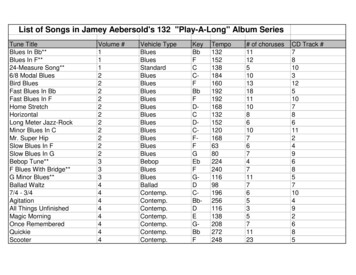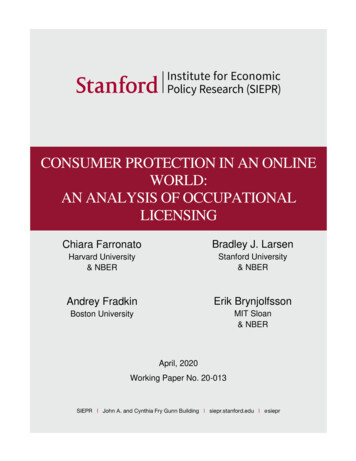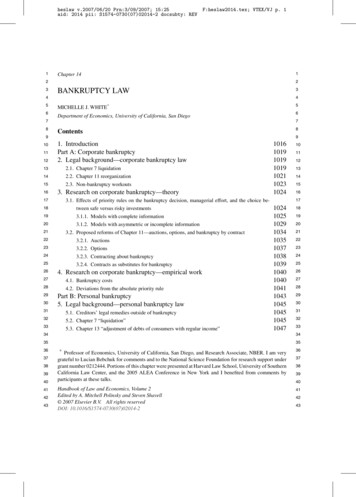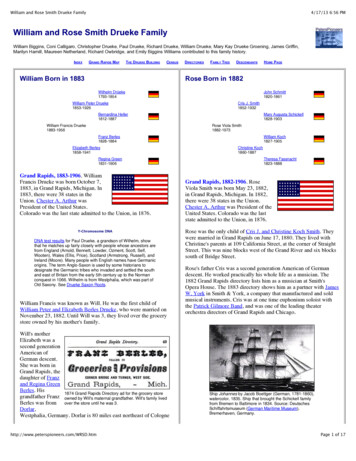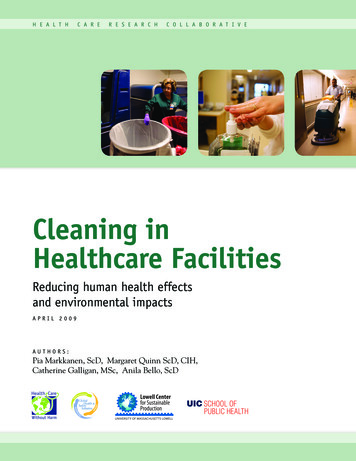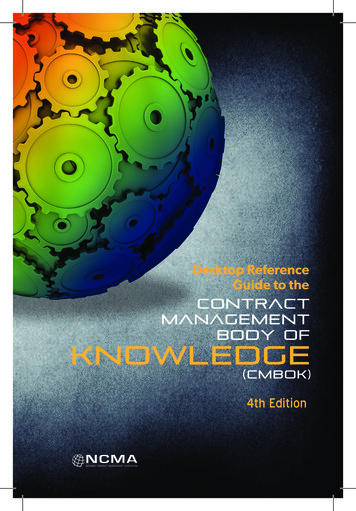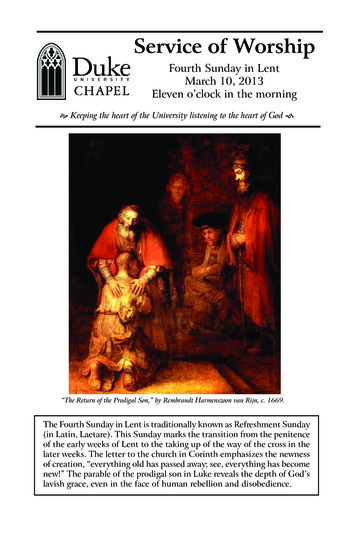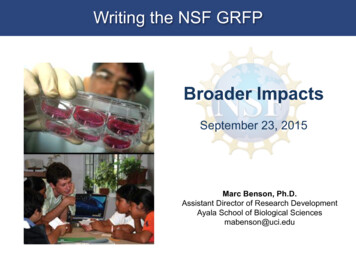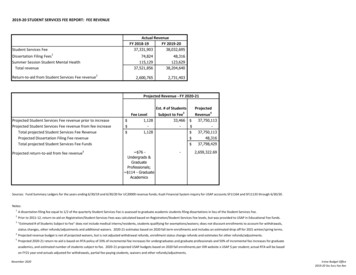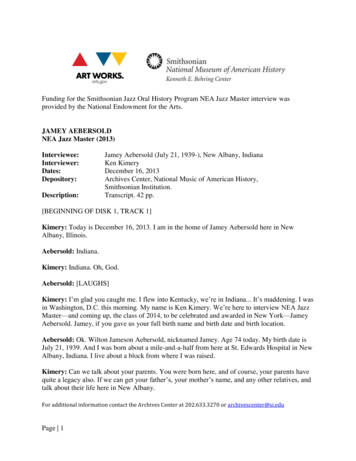
Transcription
Funding for the Smithsonian Jazz Oral History Program NEA Jazz Master interview wasprovided by the National Endowment for the Arts.JAMEY AEBERSOLDNEA Jazz Master cription:Jamey Aebersold (July 21, 1939-), New Albany, IndianaKen KimeryDecember 16, 2013Archives Center, National Music of American History,Smithsonian Institution.Transcript. 42 pp.[BEGINNING OF DISK 1, TRACK 1]Kimery: Today is December 16, 2013. I am in the home of Jamey Aebersold here in NewAlbany, Illinois.Aebersold: Indiana.Kimery: Indiana. Oh, God.Aebersold: [LAUGHS]Kimery: I’m glad you caught me. I flew into Kentucky, we’re in Indiana. It’s maddening. I wasin Washington, D.C. this morning. My name is Ken Kimery. We’re here to interview NEA JazzMaster—and coming up, the class of 2014, to be celebrated and awarded in New York—JameyAebersold. Jamey, if you gave us your full birth name and birth date and birth location.Aebersold: Ok. Wilton Jameson Aebersold, nicknamed Jamey. Age 74 today. My birth date isJuly 21, 1939. And I was born about a mile-and-a-half from here at St. Edwards Hospital in NewAlbany, Indiana. I live about a block from where I was raised.Kimery: Can we talk about your parents. You were born here, and of course, your parents havequite a legacy also. If we can get your father’s, your mother’s name, and any other relatives, andtalk about their life here in New Albany.For additional information contact the Archives Center at 202.633.3270 or archivescenter@si.eduPage 1
Aebersold: Ok. My father was Stanley Joseph Aebersold, and my mom was Wilma E. (Evelyn)Dierking. And they married in the early ’30s, I think it was. And my grandfather andgrandmother were dead before I was born, so I didn’t get to see them. I didn’t have anygrandparents at all, as a matter of fact. My father’s father, I’m pretty sure he came fromSwitzerland, and settled down in Brandenburg, Kentucky. Then he moved up to New Albany,here, Indiana, which is about 50 miles from Brandenburg, and I think he started a nursery at first,and then it moved into kind of a florist shop. My dad had been married about a year, I think,maybe two years at the most, when his parents both died, so he inherited the florist’s.I have an older brother, Stanley Joseph, named after my dad. He lives in Lexington. Myyounger is David Allen Aebersold, and he lives just down the street, and he and his wife andtheir daughter run the florist, Aebersold Florist. So it’s been going on a little over a hundredyears now in New Albany, Indiana—same location.My mom played the piano and sang, and my dad played the piano a little bit and playedthe banjo. He was part of a Banjoleers group, Indiana Banjoleers. They would play on the radioover in Louisville, way back there in the ’30s.’40s.and I remember hearing banjo music in myhouse all the time.Kimery: So that’s where the banjo comes from.Aebersold: That’s where the banjo comes from.Kimery: I know that you’re quite a fierce banjo player yourself.Aebersold: No, I’m not! I know one song. [LAUGHS] “The World’s Waiting For the Sunrise.”But I took lessons on the banjo. I lugged my banjo over to downtown Louisville every week forlessons. Doc Eastwood was the teacher, and as I recall, it seemed like he really liked my tenorbanjo, which was my dad’s, and the lesson consisted of him playing the banjo. But I learned onetune, and I still play it once a year at my summer jazz workshops.Kimery: Let’s talk about the family business there. As we drove up, you pointed out thebuilding, which is the same building. Has there been any modifications there?Aebersold: Yes, there’s been some modifications, but it’s right there in the same place. Sameplace. Same size.Kimery: And how did they get into the floral business?Aebersold: I think my grandfather started a nursery business, and then my dad took it over, andthey got into flowers. Weddings, funerals, things like that—general. Now my brother and hiswife, they run it.Kimery: Older? Younger?Aebersold: Younger. David.
Kimery: Were you at any point looked at as being the successor of that business?Aebersold: I could have been. But I told them I’d rather see what music had to offer. At thattime, I wasn’t doing much. I’m just playing jobs and teaching privately. But I seemed to enjoydoing that, so I stuck with that.Kimery: As a kid, were you actively engaged in the business itself?Aebersold: Oh, yeah.Kimery: What did it consist of?Aebersold: At a very early age, I started work, I’m sure. I’d work an hour in the afternoon afterschool. Couldn’t go out and play ball until you’d work. So I learned how to work early on.Plantin’. Pottin’. Cleanin’ off bits. Sweepin’. I worked all the way up even when I graduatedfrom college. I’d be over there at 9 o’clock in the morning and work until about 3, with an hourbreak for lunch, then come back and teach private lessons at my apartment—which I rented frommy dad, which was just across the street from the florist. So I’ve kind of stuck right here in thisarea the whole time.Kimery: Did the business extend beyond New Albany? Did it go into Louisville? Meaning didyou have business in Louisville?Aebersold: Well, they delivered to Louisville. Now they’ve got it all worked out where theytake flowers to a central point, and they deliver them way out in Louisville, and if the Louisvilleflorists have people in Indiana, they bring them over here. They have some sort of a mutualexchange, like. Back then, we didn’t deliver to Louisville much. It was basically here in NewAlbany.Kimery: Was there a greenhouse around here?Aebersold: Yes, there were greenhouses. Several of them. Four, I think. Four greenhouses. Iwant to say four. Five. Yeah. Oh yeah, it was fun when I was a kid. Playing hide-and-go-seekunderneath those beds, with the cobwebs and the spiders and stuff, and the chrysanthemums thatyou could get up in the bed and hide in, you weren’t supposed to. I remember one time we werehaving a chrysanthemum fight. The beds were so high, 24" or 30" tall, and about 4' wide, andthese big, tall chrysanthemums. I can remember one afternoon I was out there with somebody, afriend of mine, and we were pulling out these nice, big chrysanthemum blooms and throwingthem over the top, trying to hit the other person. My dad came home and caught us. Oooh, thatwas the end of that. I don’t know what I was thinking.A tornado came through there, incidentally, in 1917, and flattened the greenhouse. At thattime. Of course, I wasn’t around then. But my dad said that it lifted the barn up off of thehouse/horse(?—6:12) and took the barn about a block away and crushed it up on IndianaAvenue. We have pictures of the barn, all ruined and everything.For additional information contact the Archives Center at 202.633.3270 or archivescenter@si.eduPage 3
Kimery: Though it wasn’t one of those moments where it derailed the business. They were ableto rebuild and keep going, as we can tell.Aebersold: Yeah. Just keep going. At that point, as a matter of fact, 1917, my dad said he wasinto school here that I was telling you about, that we came by. He said they let school out and hehad to walk down and step over the power lines out here on Silver Street.Something I was going to mention to you. It has nothing to do with my early history.But the street we came in on, this Silver Street. Horace Silver Street. And we passed McLeanAvenue; that’s Jackie McLean Avenue. And if we’d gone down a little further, you would haveseen Morton; that’s Jelly Roll Morton. And yet another one up here is Lake; Oliver Lake. It’sjust a coincidence. But kids have asked me before when they noted that: “Mr. Aebersold, did youname those streets?” Cute.Kimery: That’s an interesting group there, too.Aebersold: It is. Yeah, put those guys together and let them jam.Kimery: So, since both parents were actually musically-inclined.Aebersold: Yes, very much so.Kimery: How did you find your. Besides hearing it around the house, when did you find thatmoment where you actually became a participant in this?Aebersold: I think I was about 4 years old, and my older brother was 8, and he was going to takepiano lessons from Maude Thomas. She wasn’t married. Widow. What do you call that, whenshe’s not married?Kimery: Spinster?Aebersold: Spinster, I guess. Yeah. Anyhow, my brother took lessons, and I was about 4, butthey didn’t let me take, and I was real disappointed. So I think a year later, when I was about 5,they let me take lessons. I couldn’t wait to play. But then I got really tired of practicing, and soafter five years my piano teacher finally fired me. She gave me my money back, gave me my 2bucks back, said, “Go on home, you’ll never be a musician; you don’t want to practice.” So thatwas the end of that. And then I made the natural switch to tenor banjo, because my dad played it.So I started learning the chords and things, and took lessons and so forth. Even went to Chicago.My mom and dad took me up there in about 1955 (I guess, ’55) to a convention, and we played“Lady of Spain” or something like that, you know. That was fun.But then, I couldn’t see the banjo as being a jazz instrument, and the tenor banjo inparticular, the stretch for the fingers was real wide. It’s like a cello. Everybody plays five-stringbanjo today, but back then I was playing the tenor banjo, or trying to, and I didn’t have a mentorjazz banjo. So I kind of gave it up. My brother started playing the alto saxophone, and then I
guess he kind of quit, and I kind of inherited the alto. Yeah, and I started playing alto in the sixthgrade.Kimery: So it sounds like you were wandering this path, the path to where you finally found theinstrument that became.Aebersold: Wandering, yeah.Kimery: Until you found that primary voice. Though you play other instruments quite well, too.Piano, bass.Aebersold: Yes. The piano has been my. I’m sure glad I got started on piano, because it’s themaster instrument, as far as I’m concerned. And if she had. Way back there, maybe if herteaching had been a little different, or if she had said something about improvising, I’d probablystill be playing piano, and wouldn’t have had to wander through all these other instruments.Kimery: Do you recall during those lessons what she was having you play?Aebersold: Oh, yeah. I’ve got some of the books here. Just classical, little things. Scales.Kimery: Etudes?Aebersold: Yeah, little etudes. And my older brother, when he was playing piano (and then Iwas playing, too, I guess), we worked up a couple of duets. “Bicycle Built For Two.” We’d playat a church. Then another church asked us to come out on Sunday morning, and we’d go overthere and play. I remember doing that. That was fun. But I just couldn’t see where we were goingwith practicing the scales and stuff. If she’d had me improvise, I’d still be playing the piano.Kimery: Was there much of a jazz scene here that.Aebersold: No. Well, when I was young, I didn’t know about it. I started hearing about jazz bylistening to the radio. Is it WLW in New Orleans? “From the top of the blah-blah-blah hotel, andthe Roosevelt Ballroom.” Does that ring a bell?Kimery: Yeah, I know the Roosevelt Ballroom.Aebersold: Is it in New Orleans? Somewhere, on top of some hotel. I’d have my radio onunderneath the covers, listening to it, and they played Dixieland. That was when I was about inthe seventh grade—seventh and eighth grade. I would go to the junior high school library, and Iborrowed a couple of books by jazz players. One of them was Mezz Mezzrow. They were talkingabout smoking marijuana and stuff, but they didn’t say that. I couldn’t figure out what they weretalking about. But that’s when I started listening to records, and reading probably a Downbeatmagazine, or Metronome, or one of those ones that was out back there.Kimery: How old were you then?For additional information contact the Archives Center at 202.633.3270 or archivescenter@si.eduPage 5
Aebersold: I’d say 13. 14. 12-13-14.Kimery: So at a young age, the curiosity was there for jazz.Aebersold: I think so. Just because I was involved in music. My dad played the banjo. My momplayed it. We didn’t eat a meal but what my dad put a stack of '78 records on the changer. Itwasn’t jazz. Guy Lombardo, Wayne King, people like that. Sweet bands, I think you call them.But I heard all those standards.Kimery: Besides playing it, music seemed to be a common thread within the family dynamicand the experience.Aebersold: Yes, it really was. Not jazz. But music. Popular music of the day.Kimery: Let’s talk about the community here, which is an interesting one, because you’re closeto Louisville, but you’re definitely a distance away, so it’s not as easily accessible unless youhave a driver’s license.Aebersold: Right.Kimery: I’m not sure what public transportation was like at that time. But being a bigger city.You’re really, to some degree, a little bit isolated here.Aebersold: Oh, yeah. Definitely.Kimery: So you’ve got to work twice as hard to be able to find those moments to develop yourcraft, or at least to find friends that had the same mind-frame.Aebersold: Exactly.Kimery: Was there a group of kids that you ended up running with that were also musicallyinclined?Aebersold: Yes. Band gave me that opportunity to meet other people. I tried to get the banddirector.Actually, let me back up. In the sixth grade, when I started. I went to Silver StreetSchool up here, and kind of joined the band. I think we met once a week. I thought it was reallyboring. I’d already played piano, so I could read, and I had played some banjo, and it just seemedlike the stuff we were doing was very simple, because I’m sure there were a lot of beginnersthere. So the band director was spending part of his time on just getting the kids to finger andblow the right note. And I’d already started listening to jazz. I remember that. So I said, “Well, itmust be next year when I’m a seventh-grader,” down at the junior hi
Aebersold. Jamey, if you gave us your full birth name and birth date and birth location. Aebersold: Ok. Wilton Jameson Aebersold, nicknamed Jamey. Age 74 today. My birth date is July 21, 1939. And I was born about a mile-and-a-half from here at St. Edwards Hospital in New Albany, Indiana. I live about a block from where I was raised. Kimery: Can we talk about your parents. You were born here .
